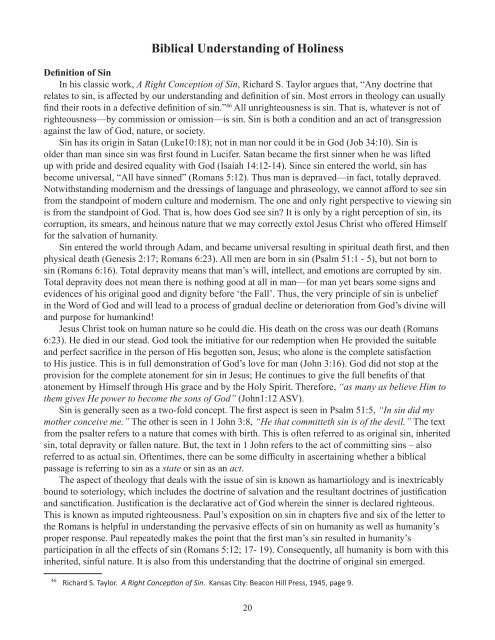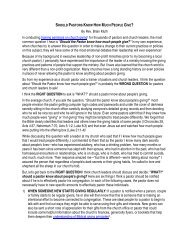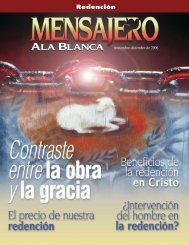The Pursuit of the Holy God - Church of God of Prophecy
The Pursuit of the Holy God - Church of God of Prophecy
The Pursuit of the Holy God - Church of God of Prophecy
You also want an ePaper? Increase the reach of your titles
YUMPU automatically turns print PDFs into web optimized ePapers that Google loves.
Biblical Understanding <strong>of</strong> Holiness<br />
Definition <strong>of</strong> Sin<br />
In his classic work, A Right Conception <strong>of</strong> Sin, Richard S. Taylor argues that, “Any doctrine that<br />
relates to sin, is affected by our understanding and definition <strong>of</strong> sin. Most errors in <strong>the</strong>ology can usually<br />
find <strong>the</strong>ir roots in a defective definition <strong>of</strong> sin.” 46 All unrighteousness is sin. That is, whatever is not <strong>of</strong><br />
righteousness—by commission or omission—is sin. Sin is both a condition and an act <strong>of</strong> transgression<br />
against <strong>the</strong> law <strong>of</strong> <strong>God</strong>, nature, or society.<br />
Sin has its origin in Satan (Luke10:18); not in man nor could it be in <strong>God</strong> (Job 34:10). Sin is<br />
older than man since sin was first found in Lucifer. Satan became <strong>the</strong> first sinner when he was lifted<br />
up with pride and desired equality with <strong>God</strong> (Isaiah 14:12-14). Since sin entered <strong>the</strong> world, sin has<br />
become universal, “All have sinned” (Romans 5:12). Thus man is depraved—in fact, totally depraved.<br />
Notwithstanding modernism and <strong>the</strong> dressings <strong>of</strong> language and phraseology, we cannot afford to see sin<br />
from <strong>the</strong> standpoint <strong>of</strong> modern culture and modernism. <strong>The</strong> one and only right perspective to viewing sin<br />
is from <strong>the</strong> standpoint <strong>of</strong> <strong>God</strong>. That is, how does <strong>God</strong> see sin? It is only by a right perception <strong>of</strong> sin, its<br />
corruption, its smears, and heinous nature that we may correctly extol Jesus Christ who <strong>of</strong>fered Himself<br />
for <strong>the</strong> salvation <strong>of</strong> humanity.<br />
Sin entered <strong>the</strong> world through Adam, and became universal resulting in spiritual death first, and <strong>the</strong>n<br />
physical death (Genesis 2:17; Romans 6:23). All men are born in sin (Psalm 51:1 - 5), but not born to<br />
sin (Romans 6:16). Total depravity means that man’s will, intellect, and emotions are corrupted by sin.<br />
Total depravity does not mean <strong>the</strong>re is nothing good at all in man—for man yet bears some signs and<br />
evidences <strong>of</strong> his original good and dignity before ‘<strong>the</strong> Fall’. Thus, <strong>the</strong> very principle <strong>of</strong> sin is unbelief<br />
in <strong>the</strong> Word <strong>of</strong> <strong>God</strong> and will lead to a process <strong>of</strong> gradual decline or deterioration from <strong>God</strong>’s divine will<br />
and purpose for humankind!<br />
Jesus Christ took on human nature so he could die. His death on <strong>the</strong> cross was our death (Romans<br />
6:23). He died in our stead. <strong>God</strong> took <strong>the</strong> initiative for our redemption when He provided <strong>the</strong> suitable<br />
and perfect sacrifice in <strong>the</strong> person <strong>of</strong> His begotten son, Jesus; who alone is <strong>the</strong> complete satisfaction<br />
to His justice. This is in full demonstration <strong>of</strong> <strong>God</strong>’s love for man (John 3:16). <strong>God</strong> did not stop at <strong>the</strong><br />
provision for <strong>the</strong> complete atonement for sin in Jesus; He continues to give <strong>the</strong> full benefits <strong>of</strong> that<br />
atonement by Himself through His grace and by <strong>the</strong> <strong>Holy</strong> Spirit. <strong>The</strong>refore, “as many as believe Him to<br />
<strong>the</strong>m gives He power to become <strong>the</strong> sons <strong>of</strong> <strong>God</strong>” (John1:12 ASV).<br />
Sin is generally seen as a two-fold concept. <strong>The</strong> first aspect is seen in Psalm 51:5, “In sin did my<br />
mo<strong>the</strong>r conceive me.” <strong>The</strong> o<strong>the</strong>r is seen in 1 John 3:8, “He that committeth sin is <strong>of</strong> <strong>the</strong> devil.” <strong>The</strong> text<br />
from <strong>the</strong> psalter refers to a nature that comes with birth. This is <strong>of</strong>ten referred to as original sin, inherited<br />
sin, total depravity or fallen nature. But, <strong>the</strong> text in 1 John refers to <strong>the</strong> act <strong>of</strong> committing sins – also<br />
referred to as actual sin. Oftentimes, <strong>the</strong>re can be some difficulty in ascertaining whe<strong>the</strong>r a biblical<br />
passage is referring to sin as a state or sin as an act.<br />
<strong>The</strong> aspect <strong>of</strong> <strong>the</strong>ology that deals with <strong>the</strong> issue <strong>of</strong> sin is known as hamartiology and is inextricably<br />
bound to soteriology, which includes <strong>the</strong> doctrine <strong>of</strong> salvation and <strong>the</strong> resultant doctrines <strong>of</strong> justification<br />
and sanctification. Justification is <strong>the</strong> declarative act <strong>of</strong> <strong>God</strong> wherein <strong>the</strong> sinner is declared righteous.<br />
This is known as imputed righteousness. Paul’s exposition on sin in chapters five and six <strong>of</strong> <strong>the</strong> letter to<br />
<strong>the</strong> Romans is helpful in understanding <strong>the</strong> pervasive effects <strong>of</strong> sin on humanity as well as humanity’s<br />
proper response. Paul repeatedly makes <strong>the</strong> point that <strong>the</strong> first man’s sin resulted in humanity’s<br />
participation in all <strong>the</strong> effects <strong>of</strong> sin (Romans 5:12; 17- 19). Consequently, all humanity is born with this<br />
inherited, sinful nature. It is also from this understanding that <strong>the</strong> doctrine <strong>of</strong> original sin emerged.<br />
46 Richard S. Taylor. A Right Conception <strong>of</strong> Sin. Kansas City: Beacon Hill Press, 1945, page 9.<br />
20

















